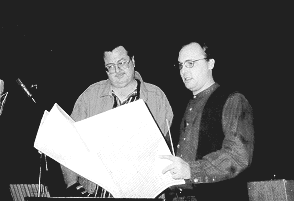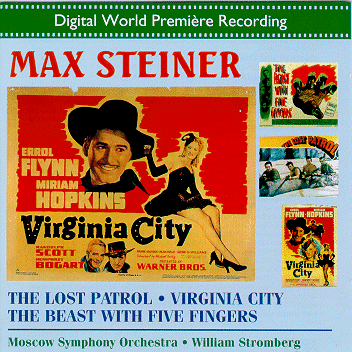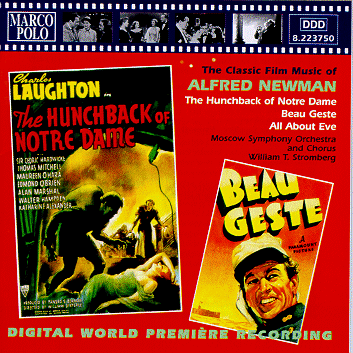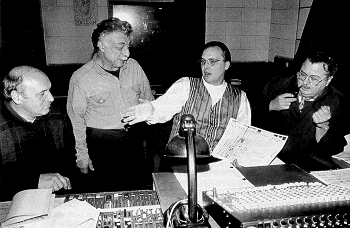
John Morgan (left) with William Stomberg
(conductor)
Courtesy of Marco Polo
Music Webmaster Len Mullenger
© Richard Adams
 |
John Morgan is a Los Angeles based musician who is active both as a film composer and as an arranger/reconstructionist of classic Hollywood film scores. He received his Masters Degree in Music at San Diego State University and studied composition with David Ward-Steinman. He has composed music for more than twenty feature films as well as scores for several television and cable productions. His next assignment is David Allen's fantasy feature film, Primevals. John, along with conductor William J. Stromberg, is engaged in a vast project for Marco Polo to reconstruct and record extended suites and complete scores from Hollywood's 'Golden Age.' So far this project has included the scores of Han J. Salter, Frank Skinner, Max Steiner, Alfred Newman, Bernard Herrmann, Erich Wolfgang Korngold, Franz Waxman, Victor Young and Hugo Friedhofer. |
John Morgan (left) with William Stomberg
(conductor) |
 Richard Adams: I'd like to believe your decision to become a film
composer was the result of a pivotal event in your early life such as the
first time you watched KING KONG and heard Max Steiner's tremendous score.
Is there any truth to this fantasy of mine?
Richard Adams: I'd like to believe your decision to become a film
composer was the result of a pivotal event in your early life such as the
first time you watched KING KONG and heard Max Steiner's tremendous score.
Is there any truth to this fantasy of mine?
John Morgan: Well truth be told, I grew up loving and listening to classical music. My parents had a lot of records and I was constantly listening to the local classical music station. I certainly was interested in film music...having seen KONG on television and those great Universal horror films in the late fifties. I guess like a normal kid, I really enjoyed the genre stuff...taking particular delight in the music. Of course, it was Mahler, Richard Strauss, Beethoven, Rimsky...and countless other classical composers that were my constant companions. Like many others, I would tape record (on reel to reel) favorite film and scores directly off the television. This was before video and I remember how much trouble I got into when I was discovered putting roach clips on the actual speaker inside the television!
RA: I believe you first met Max Steiner when you were a teen. Can you talk about that encounter and the impact it had on you?
JM: I was in the sixth grade and our class went to Warners for a tour and to learn something about film making. We went to the scoring stage and Steiner was conducting one of his scores (either FBI STORY or one film from that era, I can't quite remember). I didn't even connect him with KONG, but I did know how to play a baby version of TARA'S THEME on the piano, and my teacher knew it. Steiner asked the class if anyone could play an instrument and in my young, naive manner, I raised my hand. I went to the piano, with little prodding, and played TARA's THEME. The orchestra applauded and Max said, "Oh no, another competitor!" It was no big deal at the time, but when I really began to know the music of Steiner and connected everything, I re-met him in the mid-sixties and we became friends. When I was in the army (1968-1970), he would often write me and keep me entertained!
RA: Did Steiner ever encourage or discourage you from becoming a film composer? What was the most useful advice he gave you?
JM: I really didn't think of becoming a film composer when I knew Max. I guess we must have talked about it at times, but at that time I thought I would become a music teacher.
RA: After graduating from the San Diego State University, you went on to Hollywood and did orchestrations for some of the best composers in the business such as Fred Steiner, Bruce Broughton and Alex North. How did you come to their attention?
JM: Bruce Broughton and I got to know each other in the army band (1968). We were both stuck there!! I met Fred Steiner in early 1970 through someone who was quizzing me about a Max Steiner documentary she was preparing. Fred and I became friends, as we shared a love for the classic film scores. I was involved in Fred's recording of KONG in 1976 (I picked the cues to be recorded) and wrote some of the liner notes. I reacquainted myself with Broughton and eventually orchestrated several television projects for him. Likewise with Fred, I orchestrated hours of LAFF TUNES, which were Laurel and Hardy silent shorts for TV, and Fred got me involved in orchestrating some of North's music for his TV version of DEATH OF A SALESMAN.
RA: Do you remember your first scoring assignments? How did they come about?
JM: I first did several student films in college. One stands out, it was a 20 minute short based on a Ray Bradbury story entitled THE SOUND OF THUNDER. My first feature was THE AFTERMATH, a low-budget post-nuclear action film. Actually, SOUND OF THUNDER got me the latter film.
RA: Are there composers (film or concert) or musical trends that have directly influenced your own style of composition?
JM: Just about every composer I have embraced! Bill Stromberg remarked that he knows my last reconstruction job, as some of the fingerprints end up in my own music. Reconstructing this classic film music is the greatest education any film composer could get. I am able to delve into every minute detail and broaden my own palette.
RA: Do you have a favorite among your scores? What makes it stand out for you?
JM: Not yet. I am still waiting for that film, with a dream orchestra, that I can be left alone with to do my own thing. Although there was no budget, I am happy with DEMON IN THE BOTTLE, which I did a couple of years ago. It was a "Harryhausen" type film and I had fun with it.
RA: How did you first become involved in reconstructing film scores?
JM: Tony Thomas asked me to prepare a suite to Steiner's THE THREE MUSKETEERS. Originally, it was for live performance, but ended up on one of our early Marco Polo CDs. This led to doing some Salter stuff, which I have loved since childhood. I worked 'cheap' on the first album, proved myself and was "in like Flynn".
RA: What skills must a musician have to do this kind of work?
JM: Besides being a good orchestrater, one must really know the era and the music of the period. Any good orchestrater can orchestrate music, but when you are reconstructing a score, you must know the principles and performance/composing practices of the time. There are too many traps and holes to fill in and if you don't know what's going on, you are a dead duck.
RA: You have embarked on a very successful series of recordings for Marco Polo of classic film scores, most of which you and your friend, William Stromberg, have reconstructed from old piano sketches. How did this series come about?
JM: Our first albums were very successful, so Klaus Heymann (head of Marco Polo/Naxos) said we should make an ongoing series of it. Since this is better and more educational than working at In and Out Burger, we leapt at the chance.
RA: When did you first become acquainted with Hans J. Salter? Had you known of his music prior to Tony Thomas asking you to do the reconstructions for HOUSE OF FRANKENSTEIN and GHOST OF FRANKENSTEIN. What is your opinion of his music?
JM: I love this Universal horror music. It has been with me all my life. I knew no one else would tackle this music seriously, so I felt honored to have the opportunity to bringing it back to life.
RA: It used to frustrate me that Salter and his colleague Frank Skinner were so little known in comparison with their contemporaries Steiner, Newman and Waxman. Why do you think Salter and Skinner failed to gain the attention they deserved?
JM: They simply wrote wonderful music for films that are not known for their music. They wrote "A" music for "B" films. Everyone knows that Waxman, an "A" composer, wrote a great score for BRIDE OF FRANKENSTEIN, but poor Salter and Skinner worked mostly at Universal, which was not known for its big and important scores. In fact, Universal had a wonderful music department with many great talents.
RA: Was Salter surprised by the sudden interest in his music; coming so late in his life as it did?
JM: I think so. What a dear man. He always had fans, but doing these new recordings made him realize he had fans HE didn't know about. And even if that first recording (which Penny conducted), was not too hot, Hans was grateful and happy. He loved the great reviews the music received from classical magazines.
RA: What other scores by Salter and Skinner would you like to record?
JM: SABOTEUR, ABBOTT AND COSTELLO MEET FRANKENSTEIN, ARABIAN NIGHTS, HOUSE OF SEVEN GABLES, THE SUN NEVER SETS, BACK STREET, SON OF DRACULA, THE MUMMY'S HAND-GHOST-FOOT, .....and so many.
RA: How did Bill Stromberg become involved in the Marco Polo series?
 JM: I didn't get along with the conductor on our HISTORICAL
ROMANCES and CAPT. BLOOD album and suggested Bill to Klaus. He accepted and
I was delighted. Bill is the best. He is a fine composer and orchestrator
in his own right. I have known him since he was three, I knew his father!)
Bill has reconstructed several of our Suites ADVENTURES OF MARCO POLO, BEAU
GESTE, SCARAMOUCHE and when I ran out of time, helped me out with several
cues in HOUSE OF FRANKENSTEIN. I also seek his opinion on SUITES I have made
up. We go to Moscow together and it a real collaborative effort. He is with
me from the very start of any given project. It is a team effort in all respects.
Without Bill, I wouldn't do this stuff. We are each other's right hand.
JM: I didn't get along with the conductor on our HISTORICAL
ROMANCES and CAPT. BLOOD album and suggested Bill to Klaus. He accepted and
I was delighted. Bill is the best. He is a fine composer and orchestrator
in his own right. I have known him since he was three, I knew his father!)
Bill has reconstructed several of our Suites ADVENTURES OF MARCO POLO, BEAU
GESTE, SCARAMOUCHE and when I ran out of time, helped me out with several
cues in HOUSE OF FRANKENSTEIN. I also seek his opinion on SUITES I have made
up. We go to Moscow together and it a real collaborative effort. He is with
me from the very start of any given project. It is a team effort in all respects.
Without Bill, I wouldn't do this stuff. We are each other's right hand.
RA: Most of your recordings use the Moscow Symphony Orchestra. Is there something special about this orchestra that makes them adapt at performing these old scores?
JM: They are first-rate players. They can play different styles. We can get all the extra and non-traditional instruments (saxophones and guitars etc.) as well as choir. And they love playing this music.
RA: I suspect the players aren't that familiar with the films, let alone the scores, that you record with them. Do the members of the orchestra screen these films or listen to the original soundtracks before they record them?
JM: Hardly ever. It is up to Bill to bring the feeling and mood and style of the music to the orchestra from his podium.
 |
RA: How do you choose which scores to record?
JM: I have a completely free hand in choosing the music and making up the programs on the albums. One of my main concerns is NOT to do bits and pieces of a given score, but do all the music I feel works well away from the film AS MUSIC. So I let the music determine whether a title will be 10 or 20 minutes...or an entire disc. I try to pick the best music from Hollywood's Golden Age. And if we do a score that has been done before, I won't do it unless we can offer something more. RA: Of the discs that you've made so far, which stand out for you? |
Recording Engineers Vitaly Ivanov, Edvard
Shakhnazarian, |
JM: I hate to pick a few...they all hold something near and dear to me. Every album I have a passion for. It is just too much damn work to do things I really don't care for. |
RA: Most of the scores you've recorded have been by well known Hollywood-based film composers, but recently you recorded Philip Sainton's score for MOBY DICK. Sainton is a wonderful but little know British composer. What inspired you to do Sainton's score?
JM: Bill Whitaker found his daughter and she had most of the written music to this film. I have loved this score for 30 years. I am glad we could do an entire album of it.
RA: Are there scores by British composers for British films that you have plans to record?
JM: No plans yet, but I would love to do a complete CURSE OF THE DEMON, DEAD OF NIGHT, SO LONG AT THE FAIR and about a dozen others. Finding any music to British scores is tough. Most have been lost or destroyed.
RA: One of your most recent releases is KING KONG. This the third time this score has been re-recorded in a near complete form if you count the version put out on United in the mid 70s. The recording Fred Steiner made with the National Philharmonic was very fine, why did you want to redo it?
JM: It is truly a masterpiece in the truest sense. That score should be recorded every 20 years. It needed to be done complete and with orchestration that was more faithful to the original.
RA: Are there scores that others have recorded that you would like to redo yourself? I can think of several that need it such as BRIDE OF FRANKENSTEIN, REBECCA and THE BIG COUNTRY.
JM: You certainly named a few! I don't know how commercial something like that would be. I would like to do an authentic complete recording to THINGS TO COME. And I want to do GHOST OF FRANKENSTEIN again, so we can retire that earlier recording.
RA: Are there any scores that you can't reconstruct and record of copyright laws, studio interference, problems composer's estates or lack of performing materials?
JM: Not yet. Only the lack of any piano or conductor scores would preclude any project.
RA: Once you and Bill have reconstructed and recorded the music, what happens to the conductor's score and parts? Do you make the music available for other orchestras to perform and/or record?
JM: They go to Brigham Young University, where the Steiner and Friedhofer music is archieved. Hopefully, our Suites will be played in concerts.
RA: Along with such well known composers as Steiner, Herrmann, Korngold, Newman and Waxman, you have devoted discs to lesser known Hollywood composers such as Hugo Friedhofer and Victor Young. Do these composers "sell" as well as the bigger names? If they aren't as popular as, say Bernard Herrmann, is it worth the risk of poor sales to record their music?
JM: So far, we haven't had poor sales of anything. Friedhofer I was worried about, but it seems to have caught on. I try to program our CDs where we can occasionally include a "harder sell" composer. I want to do Roemheld, Kaplan, Mockridge, and others.
RA: I'm especially fond of the vastly underrated Roy Webb. Do you have plans to record his music?
JM: I hope to do a Val Lewton CD in the near future. Also, his scores for some film noir are marvelous...along with things like SINBAD THE SAILOR and LAST DAYS OF POMPEII. He did some marvelous, subtle things in his scoring.
RA: Do you see yourself recording some older scores by today's popular film composers such as John Williams, Jerry Goldsmith, Elmer Bernstein, etc.?
JM: Perhaps, but these composers are so well represented on CD. Also, we try to record only those scores where there is not a first-rate recording already in existence. But I hope Goldsmith or Universal puts out LIST OF ADRIAN MESSENGER or we may have to do it.
RA: Can you give us a sneak preview of the scores you plan to record in the near future?
JM: Already recorded, but not released is VICTOR YOUNG (Uninvited, Bright Leaf, Gulliver's Travels), Waxman's MR. SKEFFINGTON, Korngold's DEVOTION, Herrmann's GARDEN OF EVIL, Sainton's MOBY DICK. In a couple of weeks we will be doing THEY DIED WITH THEIR BOOTS ON (Steiner) and Newman/Herrmann THE EGYPTIAN. Beyond this, we haven't locked everything down, but Webb is definitely close.
RA: Do you see Marco Polo continuing your series for the foreseeable future?
JM: As long as they continue to make money, we will do them...unless I kick the bucket.
RA: Now a question I can't resist asking: What are your Desert Island Film Scores? You can pick as many as you like.
JM: Hope this doesn't sound glib, but they are being released by Marco Polo.
RA: Any chance we soon might see one of your scores featured on a Marco Polo disc?
JM: So far, my taste has not faltered, so I don't think this will happen in the immediate future.
April 1998
Return to Film Music Main page